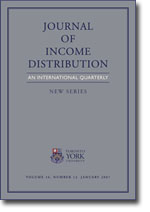
田近教授が編集者となる学術誌特集号が発刊されました。
|
 Journal of Income Distribution の最新号 (volume 16, number 3-4, 2007) では、日本の所得分配を特集として扱っています。
Journal of Income Distribution の最新号 (volume 16, number 3-4, 2007) では、日本の所得分配を特集として扱っています。
その編集には、府川哲夫氏(国立社会保障人口問題研究所)、小塩隆士教授(神戸大学、大学院経済学研究科)とともに公共経済プログラムの田近栄治教授(一橋大学、国際・公共政策大学院)があたっています。
内容は、三人の編集者による解題のほか、日本の所得分配について6本の論文から構成されています。
近年の所得格差の発生メカニズム、高齢者の所得分配、再分配政策としての所得税の役割、変化する家族など最新の研究成果が収録されています。以下の英語での概要紹介もご参照ください。(12/10)
Journal of Income Distribution
SPECIAL ISSUE: Income Inequality in Japan
Volume 16, Number 3-4 (September-December 2007)
The Journal of Income Distribution, Volume 16, Number 3-4 (September-December 2007) is now out.
This volume is dedicated entirely to the study of income inequality in Japan. The six articles in this Special Issue, guest-edited by Takashi Oshio, Eiji Tajika, and Tetsuo Fukawa, tackle income distribution in Japan from different perspectives.
These include an assessment of the trends and challenges to policy-making regarding income inequality by Tetsuo Fukawa and Takashi Oshio, an analysis of the economic conditions of the elderly by Atsuhiro Yamada, a study of the role of personal income tax as an instrument to mitigate widening income inequality by Eiji Tajika and Hiroyuki Yashio, an investigation of the impact of changing employment patterns among the young on income disparities by Seiichi Inagaki, an examination of use of the public assistance program by Wataru Suzuki and Yanfei Zhou, and a study of the role of married women's labor supply on family earnings distribution by Yukiko Abe and Akiko S. Oishi.
While different in their foci, all six articles emphasize, as the editors note in their introduction to this Special Issue of the Journal of Income Distribution, that:
- Widening income inequality in Japan has been real, and it is reasonable to be seriously concerned about it;
- Although we cannot fully explain the considerable disparity between the rate of Public Assistance and the relative poverty rate in Japan, there exists the issue of how to support low-income people, which has structural and long-lasting aspects; and,
- Social security programs and taxation need to be more effective in reducing income inequality, especially poverty problems for households with lower incomes.
|

|